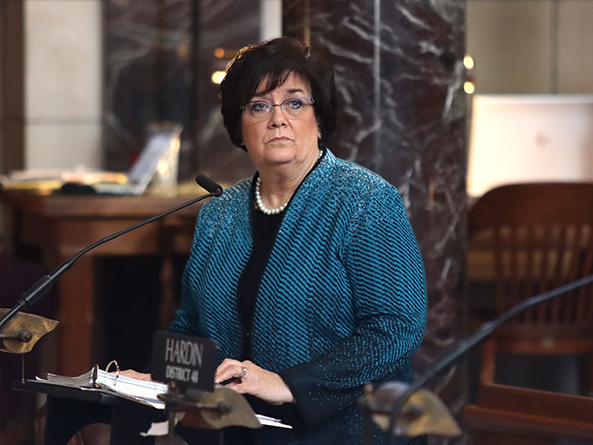Educator, librarian obscenity measure stalls
After three days of debate, a bill that would attempt to change certain criminal protections for educators and library staff failed to advance from general file March 20.

Under current law, it is a Class I misdemeanor to prepare, distribute, order, produce, exhibit or promote obscene material or possess such material with the intent to do so. A Class I misdemeanor carries a maximum penalty of a $1,000 fine or one year in jail.
State law also provides an affirmative defense for teachers and librarians if charged with possession, distribution or exhibition of obscene material to a minor if the individual is employed at an “established and recognized educational institution” and engaged in educational activity. LB441, introduced by Thurston Sen. Joni Albrecht, would narrow that provision to apply only to employees of postsecondary educational institutions.
Currently, Albrecht said, it is against the law to show criminally obscene materials to minors, except in K-12 schools and libraries. LB441 would close this “loophole” in Nebraska law, she said, and hold all adults to the same standard.
“It makes no sense that schools and libraries, of all places, should be given a pass to expose children to material that the law would already recognize as criminally obscene to children,” Albrecht said.
Glenvil Sen. Dave Murman supported the measure. He said that while opponents may argue that the bill infringes on First Amendment rights, obscenity is not a legally or constitutionally protected form of speech.
Also speaking in support of the bill was Bellevue Sen. Rick Holdcroft, who said he read classics by authors such as John Steinbeck and William Shakespeare as a student. Students today can do the same, he said, and read and learn from books that do not contain sexual content.
“There are some great classics out there that I think express the same kind of things,” Holdcroft said.
Lincoln Sen. Danielle Conrad opposed the bill. LB441 could have a “chilling effect “on the ability to recruit and retain teachers and librarians, she said, due to fear of criminal prosecution. Conrad also argued that librarians are well-trained in what is appropriate material for students and should be able to do their jobs without political interference.
“If we have challenges in our schools, we need to turn down the temperature with these manufactured culture war issues,” she said. “We need to be clear-eyed and thoughtful about providing resources and a constructive political dialogue to ensure that our public schools remain strong.”
Conrad offered a motion March 18 to bracket the bill until the end of the legislative session, which failed on a 12-28 vote. She filed several additional motions to extend discussion.
During debate March 18, Hastings Sen. Steve Halloran read an excerpt from the memoir “Lucky,” in which author Alice Sebold explicitly describes a rape that she survived while in college. During the reading, he inserted the name “Sen. Cavanaugh” several times, prompting calls from some fellow senators and others for his resignation.
Sen. Raymond Aguilar of Grand Island, chairperson of the Executive Board, announced March 20 that he had filed a complaint against Halloran in accordance with the Legislature’s sexual harassment policy and that an investigation had begun.
Plymouth Sen. Tom Brandt said he understood the desire to protect children but expressed concern that LB441 would allow a “vocal minority” to control which literary works the majority can access. School boards and librarians should be trusted to do what is best for their districts and students, he said.
“I’m concerned about the unintended consequences,” Brandt said, adding that even classic literature could be attacked as obscene.
Sen. John Cavanaugh of Omaha also opposed the measure. He argued that a book’s context is important, and said a few passages that some find offensive may not reflect a work’s educational, historical or artistic value.
“You don’t have the context to determine what the value of that book is or what value that particular excerpt brings to the context as a whole,” Cavanaugh said.
After eight hours of debate, Albrecht offered a motion to invoke cloture, which would end debate and force a vote on the bill and any pending amendments.
The cloture motion failed 30-17, with 33 votes needed. A failed cloture motion results in debate on a proposal ceasing for the day. LB441 is unlikely to be placed on the agenda again this session.


